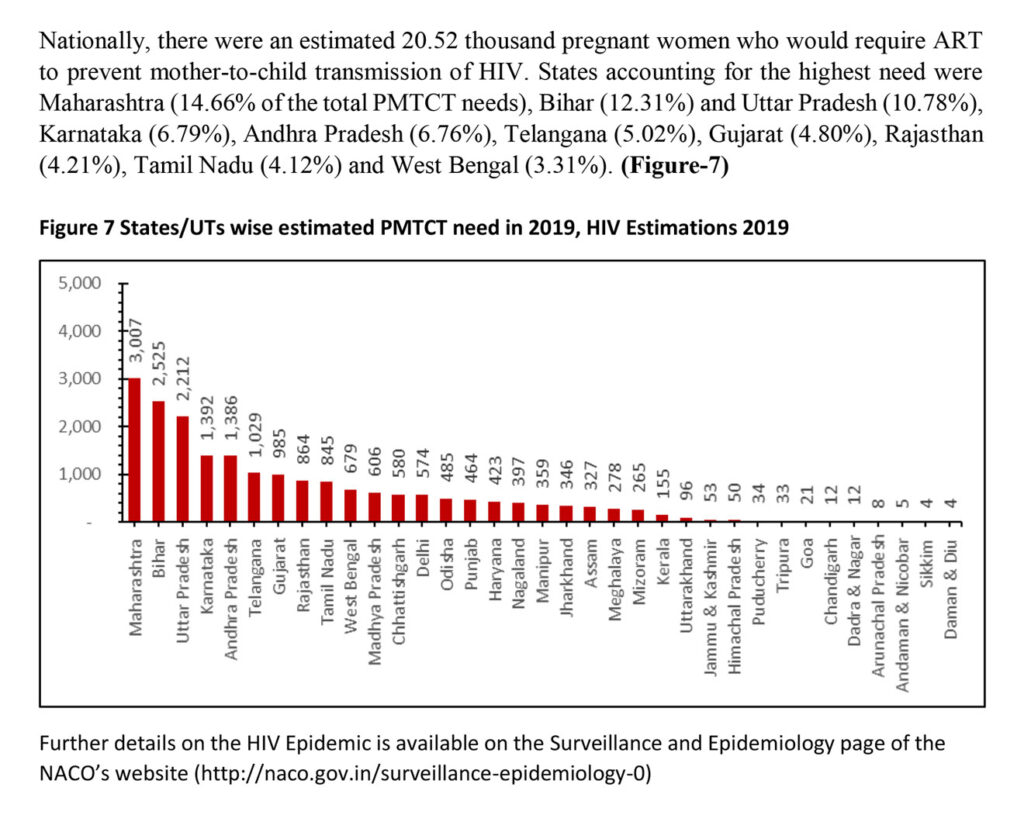Preventing HIV (Human Immunodeficiency Virus) transmission during pregnancy is critical for the health of both the mother and the infant.
Lets’ see some facts and figure
- According to राष्ट्रीय एड्स नियंत्रण संगठन (NATIONAL AIDS CONTROL ORGANISATION) An estimated 20.52 thousand pregnant women nationwide would need antiretroviral therapy (ART) in order to avoid HIV transmission from mother to child. Maharashtra (14.66% of all PMTCT needs), Bihar (12.31%), Uttar Pradesh (10.78%), Karnataka (6.79%), Andhra Pradesh (6.76%), Telangana (5.02%), Gujarat (4.80%), Rajasthan (4.21%), Tamil Nadu (4.12%), and West Bengal (3.31%) were the states with the greatest need.

- It is stated in https://www.statista.com. The number of pregnant HIV-positive women in India from 2017 to 2022 As of 2022, barely over 13,000 pregnant women in India had tested positive with HIV. This is an increase from 2021, when just over 11,000 women tested positive for HIV.
What is HIV?
The human immunodeficiency virus, or HIV, is a virus that targets the immune system, the body’s natural protection against illness. The virus gradually weakens the immune system, making it more difficult for the body to fight infections and diseases. If HIV is not treated, it can progress to AIDS (acquired immunodeficiency syndrome).
Here are some crucial measures for preventing HIV infection during pregnancy, according to Dr Astha Dayal (Gynecologist, Obstetrician, and Laparoscopic Surgeon in Gurgaon).
Preconception Planning:
Women of reproductive age who are HIV-positive should think about preconception planning. Before becoming pregnant, discuss family planning and HIV prevention techniques with your Gynaecologist.
HIV Testing:
As part of prenatal care, all pregnant women should be routinely tested for HIV. Early detection of HIV status allows for adequate measures to prevent transmission to the infant.
Antiretroviral Therapy (ART):
If a pregnant woman tests positive for HIV, antiretroviral medication (ART) should begin as soon as possible. ART aids in the suppression of the virus by lowering the viral load in the blood and other body fluids, lessening the risk of transmission to the fetus.
Regular Prenatal Care:
Early and consistent prenatal care is very important for HIV-positive mothers. At our centre, Dr. Astha Dayal, a renowned gynaecologist, always keeps an eye on the mother’s health, modifies medications as needed, and offers the best advice on how to reduce the risk of transfer.
Scheduled Caesarean Section (C-Section):
In circumstances where a woman’s viral load is high, a planned cesarean section (C-section) may be recommended to further limit the chance of transmission during birthing.
Breastfeeding Should Be Avoided:
Because HIV can be spread through breast milk, women living with HIV should avoid nursing. Formula feeding or other safe feeding methods should be utilized instead.
Methods of Safer Conception:
If a woman and her partner have HIV and want to have a baby, they should talk to their gynaecologist, or you can visit our Dr. Astha Dayal Clinic or CK Birla Hospital in Gurgaon about safer techniques of conception. This may include timed intercourse and other methods to limit transmission risk.
Prevention of Sexual Transmission:
Safe sex practices are critical for preventing HIV transmission to partners and protecting both people’ health. Condom use that is consistent and correct can considerably lower the chance of transmission.
Partner Testing and Involvement:
It is critical that both spouses are HIV-positive. If one partner has HIV, the other partner should be tested and, if negative, preventive steps should be taken. Open communication between spouses, as well as their participation in healthcare decisions, are vital.
Education and Counseling:
Pregnant women living with HIV should be educated and counselled so that they may make informed decisions about their own and their baby’s health. This contains details about drug adherence, lifestyle decisions, and the significance of follow-up care.
It is critical for HIV-positive pregnant women to cooperate closely with healthcare experts who specialize in HIV care and prenatal care.
Individual circumstances may differ, and healthcare experts can adjust the approach to guarantee the greatest outcomes for both the mother and the infant.



